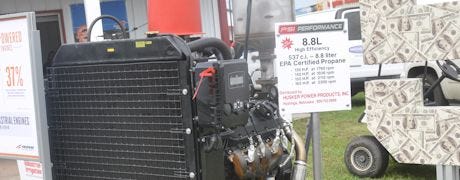
New technology in irrigation engines, along with incentives being offered through the Propane Education and Research Council's Farm Incentive Program, makes switching to propane-powered irrigation an increasing choice for farmers, says Cinch Munson, PERC's director of agriculture business development.
SRC Power Systems, a division of one of the nation's leading producers of off-road engines teamed up with PERC to produce a new 8.8-liter propane irrigation engine that officers an alternative to the Tier 4 final diesel engines. PERC provided industry expertise and financial support throughout the research, development, and testing process.

ON DISPLAY: This 8.8-liter Origin engine is one of several on display at the Nebraska Propane Gas Association Booth No 550 at Husker Harvest Days through Thursday in Grand Island, Neb.
"The cost of one of these engines is half that of the Tier 4 diesel, it is considerably easier and quicker to install and it costs substantially less to run, so for a farmer there really isn't a down side," said Munson.
Munson, who was manning the PERC booth at Husker Harvest Days in Grand Island, Neb. on a rainy opening day on Tuesday, said he had hoped to have an SRC engine on display at the show, but wasn't able to get one in time.
"They will be coming on the market next month," he said. "And they will qualify for a $3,250 incentive through the Propane Farm Incentive Program."
Cutting fuel costs
Internal testing of the new engine shows it can significantly reduce farmers' input costs, according to Kevin Snyder, a sales manager with SRC Power Systems.
"If a farmer is running the engine an average of 1,000 hours per year, they can save up to $3,000 in fuel costs each year, compared to a similar diesel engine," Snyder said. "Over the course of the engine's long lifespan, that savings can equal as much as $45,000."
When used for agricultural applications, the 8.8-liter engine offers approximately 30-40 more horsepower than similar diesel engines, making it ideal for pumping deep irrigation wells.
In addition to the operational savings, the new engines are also cleaner-burning that diesel engines and offer 11% less greenhouse emissions than diesel systems and 20% lower emissions than gasoline.
Several propane engines, including those make by Origin and PSI are on display at the Nebraska Propane Gas Association booth, No. 550, at Husker Harvest Days. A working Origin engine is attached to an irrigation system in a demonstration field on show grounds.
Munson said propane is an extremely safe fuel when used correctly.
"A spill will evaporate in a matter of minutes without requiring haz-mat cleanup and doesn't contaminate surface or ground water," he said.
Propane is also in good supply across much of farm country. It is a byproduct of both natural gas production and oil refining but the primary source is natural gas.
As for prices, Munson said farmers need to look at propane prices as they would any other commodity.
"Study the markets, know what you need for supplies and place your order when you can lock in the best price," he said. "It's like anything else you buy. You have to learn the market."
About the Author(s)
You May Also Like




